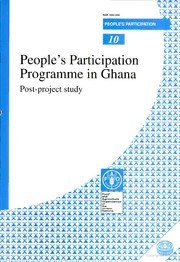
People's participation programme in Ghana : post-project study PDF
Preview People's participation programme in Ghana : post-project study
xxxx: cxxx: ISSNt02O-122X ixxx: PEOPLE'SPARTICIPATION :x: ^x: i^xx: i^xx: <xx: i^xx: <xx: People’s Participation i^xx: xxx: Programme in Ghana xxx: .xxx: :xxx: Post-project study i:xxx: xxxx: .xxxx: i^xxxx: xxxxx: xxxxxx: xxxxxx: xxxxxxx: ^xxxxxxx: xxxxxxxx: xxxxxxxxx: xxxxxxxxxx: xxxxxxxxxxx: xxxxxxxxxxxx: xxxxxxxxx: xxxxxxxxx: .ax xxxxxxxxx: vXXX xxxxxxxxx: ^XXXXX xxxxxxxxx: xx.x-x.xwxXx,Xx^XxxXxXXx^XXxxXXxxXXxxXXxxXXxxXXxxXX^xXX^:aOotUFANfhnrganoerig;tdoitaidcenoudin^lzstaut^rieonk^^XxXxXxXxXxXxXxXxXx': ISSN1020-122X PEOPLE’SPARTICIPATION People’s Participation Programme Ghana in Post-project study Basedontheworkof JeffMuller FCX)DANDAGRICULTUREORGANIZATIONOFTHEUNITEDNATIONS Rome,1995 Copyrightedmaterial 'i•II TpoNafruarnhobteenlmiatiodieceneoarssrtpsiiacgoooronnftrradobtKifotioesoutmnhnnaioesdutntaeFghirmoomitrpopeihlldsteyoialeytesnehg,dedaloeAargxsnrtpdicarctoetuunshlscesteoiuprforrnenaeisnOonefrygngactaonatnuhtyjneito2orpandyileo,ntlfioitnommeniarorttfwiaethtrtoiaihroaeytn,lsUcoIroinetftitvytheioeitrrdss ‘i M-64 ISBN92-5-103698-5 cmpVArPloeieuultpabcrrlythrpieriiaeoicgvndshgaaieethltclsitlaaoselrnnoye,sTwdssentepeeerrhxrvmmote.,etedon.AodctiporNppoColyftaFilrrtocrpaahaa>oncetrgsdaitmlroaiotoenrtnafpst,drteoofh0dtAdoih0gurserI1crnpits0wuciu0buiaocllsnnRhlte,ycuo.arpsmiefewheiorioOo,rbmurn>imlgIosdamtusanoatlibriyyoz.entab,hbtayeeidwodapirnrrtneiehoypofsrrsatomehdpedesueatcrnUtaemnosdtii,,esttmsheseieedtnoloDetnNricartetooerdiffcootninttoinshhrc.a,,ee ©FAO1995 Copyrightedmaterial Acknowledgments ThisStudywasmadepossiblebyanagreementbetweenthePaulH.NitzeSchool ofAdvancedInternationalStudiesoftheJohnsHopkinsUniversityandtheFoodand AgricultureOrganizationoftheUnitedNations. ThanksareduetothestaffoftheRegionalOfficeforAfricaoftheFoodand AgricultureOrganization,ThePresbjterianChurchofGhanaandTheCatholicDiocese ofSunyani.Inparticular,specialthanksto:Mr.A.A.Fayossewo,Mr.E.Kissiedu-Ayi, Mr.L.Adjei-Dampare,Mr.A.Adomako,andMr.S.S.Mumuni,allofwhoseefforts greatlyfacilitatedthecompletionofthisstudy.Finally,thankstoRichardHughesforhis helpeditingthefinalreport Theopinionsexpressedinthisreportarethoseoftheauthorandvariouspeople interviewed.Theydonotnecessarilyreflecttheviewsofthesponsoringinstitutions. JeffMuller February5,1994 Washington,D.C. TH1.S On« 9P14-928-H68F.ntedmai Contents Acronyms ii ExecutiveSummary t 1.Post-ProjectStudyofPPPGhana y 2.ProjectBackground v 3.StudyFindings vi 4.ConclusionsandRecommendations iii I. Post-ProjectStudyofPPP-Ghana 1 1.Purpose 2.Methodology 3.DifficultiesEncounteredDuringFieldResearch 2 II.ProjectBackground 3 1 ThePeople’sParticipationProgramme 3 2,PPPPilotProjects 3 3,ThePPPPilotProjectinGhana 4 4,HistoryofPPPGroupFormation 6 5,FactorsContributingtotheDifficultyofProjectImplementation 8 in.StudyFindings 10 21..RPePpPliGcartoiuopnaSunsdtaIinnsatbiitluittiyonalizationofthe ^ 3.PBePnPefdietvsetloopPmPePn-tGhaappnraoaPcarhticipants 2^0 IV.StudyConclusionsandRecommendations 38 21..BSuesnteafiintasbialnidtyCaonstdsFouftuPrPePo-fGhPaPnPagroups 339S 453...IPRnePsctPoitmDumeteivonendlaaloitpzimaoetninostnAapnpdrRoeapclhication 4^M1 References 47 Appendices ^ AAppppeennddiixxII;I: CKoeuyntErlyemBeanctksgorfoutnhdePPPDevelopmentApproach ^^ AAppppeennddiixxIIIVI:: IGnrsotuimptiFoonramlatAirorna,ngMeemmebnetrsship,andStructure 5^3 AppendixV: CreditandSavingsComponent 63 AppendixVI: IssuesDiscussedwithPPPGroups 6S AppendixVII: PPPGroupsVisited 72 AppendixVllI: IndividualsInterviewed 75 iii Copyrightedmaterial Acronyms AA ActionArea BACCSOD BrongAhafoCatholicCo-operativeSocietyforDevelopment CCG ChristianCouncilofGhana CDS CatholicDioceseofSunyani CENCOSAD CentreforCommunityStudies,ActionandDevelopment ERP EconomicRecoveryProgramme FAO FoodandAgricultureOrganizationoftheUnitedNations FAO/RAFR FAO'sRegionalOfficeforAfrica FAO/Rome FAO'sWorldHeadquartersinRome GCB GhanaCommercialBank GCRF Guarantced-Cum-RiskFund GDP GrossIXtmesticProduct GP GroupPromoter lA Inter-groupAssociation IGA IncomeGeneratingActivity MLG MinistryofLocalGovernment NCS NationalCatholicSecretariat NGO Non-govemmentalOrganization NPC NationalProjectCoordinator PC ProjectCoordinator(ofanActionArea) PCG PresbyterianChurchofGhana PIC FYojcctImplementingCommittee PMOE ParticipatoryMonitoringandOn-goingEvaluation PNDC ProvisionalNationalDefenseCouncil PPP People'sParticipationinRuralDevelopmentThroughI^romotionof Self-HelpOrganizationsProgramme(People'sParticipation Programme) PPP-Ghana PPPProjectinGhana PPPgroup Sejf-helporganizationformedbyPPP-Ghana PRC ProjectReviewCommittee WCARRD WorldConferenceonAgrarianReformandRuralDevelopment iv Copyrightedmaterial ExecutiveSummary 1.Post-ProjectStudyofPPP-Ghana TheFoodandAgricultureOrganizationoftheUnitedNations(FAO)established thePeople'sParticipationProgramme(PPP)ProjectinGhanainearly1982.AfterFAO’s involvementintheprojectendedin1992.itproposedaPost-ProjectStudyofthePPP ProjectinGhana(PPP-Ghana).Thepurposeofthestudywastoanswerthree fundamentalquestionsconcerningtheproject'slong-termimpact.First,howsustainable andself-reliantweretheorganizationsformedbytheproject?Second,towhatdegreewas thePPPdevelopmentapproachinstitutionalizedandreplicatedinGhana?Third,what benefitsdidindividualsandtheirorganizationsreceivefromtheproject? 2.ProjectBackground FAOestablishedPPPin1980basedontherecommendationsoftheWorld ConferenceonAgrarianReformandRuralDevelopmentthatcalledforgreater participationoftheruralpoorintheirowndevelopment.PPPestablishedpilotprojectsas ameth(xlofincorporatingpeople'sparticipationintolargerruraldevelopmentprograms. Thesepilotprojectswereintendedtopromotetheformationofsmall,self-helpgroupts thatwouldallow’memberstodevelopincome-generatingactivities,receiveservicesfrom otherdevelopmentagencies,andserveasavoicefordealingwithlocalauthorities. ThePPPpilotprojectinGhanabeganin1982,andhassubsequentlyprogressed throughfourphases(Phase1,Phase11,theTransitionPhase,andPhase111).WhileFAO involvementintheprojectendedwiththeterminationoftheTransitionFliasein1992,the projectcontinuesintoPhase111directlymanagedandfiindedbynon-governmental organizations(NGOs).Phase111projectactivitiesarepresentlyscheduledtolastfour yearsandendin1996. PPP-Ghanawasimplementedintwoseparateactionareas(AAs);theWenchiAA inBrongAhaforegionandtheBegoroAAinEasternregion.InbothAAs,theprocessof groupformationbeganinlate1983andcontinuedthrough1988.Duringthisperiod,the projectfacilitatedtheformationof237groupsinBegoroAAand211groupsinWenchi AA.Onlyafractionofthese,however,werefunctioningatanyparticulartime.For example,duringPhaseII,only126and123groupsexistedinBegoroAAandWenchi AArespectively. AvarietyoffactorsmadeimplementingPPP-Ghanaespeciallydifficult.Amongthe mostimportantwerethedifficultpoliticalandeconomicconditionsinGhanainthe 1980s,theinnovativenatureofPPP,reducedFAOsupen'ision,andlimitedfunding V Copyrightedmaterial availabletotheproject.Thesefactorsoftenworsenedthemistakesmadeduringthe project'simplementation.WhileFAOandprojectstaffw'ereabletoovercomemanyof thesemistakes,somepersistedandlimitedtheproject'ssuccessthroughoutitslifetime. 3.StudyFindings PPP-Ghanaencounteredlittledifficultyachievingitsnumericalobjectivesfor groupformation.Withrespecttoitsmoreimportantgoalofpromotinggroupself-reliance andsustainability,however,theprojectconsistentlyfellshortofitssetobjectives.Bythe summerof1993,only1percentofPhaseI,18percentofF*haseII,and36percentof TransitionPhasegroupswerestillactive.Whiletheprojectwasabletocorrectsomeof itsearlymistakesandincreasethesustainabilityofthePPPgroupsinBegoroAA,the projectprovedunabletodevelopsustainablePPPgroupsinWenchiAA. Althoughnumerousfaetorscontributedtotheproject'sgeneralinabilitytodevelop sustainableself-helpgroups,themostimportantwastheproject'ssavingsandcredit component.Earlyintheproject,PPPgroupswereformedalmostexclusivelytoreceive creditandinputs.WhenFAOofficialsandprojectstafftriedtodiversifythesePPP groupsbypromotinggroupincome-generatingactivities(IGAs)andgroupsavings,these activitieswereoftenpromotednewrequirementsforadditionalcredit.Therefore,when projectcreditendedin1988,mostgroupIGAsandsavingsendedandthegroups themselveseventuallycollapsed. Anotherimportantfactorthatcontributedtogroupfailurewasthelackand inapproprialenessofgroupincome-generatingactivities.Fully40percentofPhaseIIPPP groupshadnogroupIGAwhatsoeter,andmanyoftheremaininggroupsonlyhadgroup IGAsinordertoreceiveprojectcredit.Inaddition,75percentofgroupIGAsweregroup farmsthatprotedtobelocallyinappropriateforgroupaction.Finally,theinternal structureofPPPgroups,includingtheirheterogeneity,weakleadership,andineffective bylaws,recordkeepingandproblemsolving,contributedtothedevelopmentof dependentPPPgroupsthatcouldnotwithstandtheendofprojectcredit. WhilepromotingPPPgroupsustainabilitywasacentralelementofPPP-Ghana, institutionalizationandreplicationofthePPPdevelopmentapproachwasalsoan importantobjectiveofthisPPPpilotproject.ThegovernmentofGhana,variousNGOs, andFAOhaveallbeeninvolved,tovaryingdegrees,ininstitutionalizingandreplicating thePPPdevelopmentapproach.Aswithpromotinggroupsustainability,however,the projectencounteredvariousbarrierstoinstitutionalizationandreplication.Theseinclude thelackprojectsuccessatdevelopingsustainableself-helpgroups,theproject'sconfused institutionalarrangements,thehighrateofstaffturnover,insufficientstafftraining,the Copyrightedmaterial lackofeffectiveparticiftatorymonitoringandon-goingevaluation(PMOE),andthe almostcompletelackofactionareaProjectImplementingCommittees(PICs). ThefourthandlastphaseofPPP-Ghana,calledPhaseIII,representsthemost significantexampleoftheinstitutionalizationofthePPPdevelopmentapproach. InstitutionalizationbeyondPhase111,whetherinthelocalcommunitiesorwithinthe implementingNGOs,hasbeenverylimited.Additionally,therehasbeennoformal replicationofthePPPdevelopmentapproachinGhana.Theprojecthasserved,however, toincreaseawarenessofparticipationindevelopmentandincreasetheleveloflocal participationinvariousgovernment,NGO,andFAOdevelopmentprojects. AlthoughthesustainabilityofPPPgroupsandtheinstitutionalizationand replicationofthePPPdevelopmentapproachhasbeenlimited,variousindividualsand organizationsbenefitedsignificantlyfromtheprojectduringitsfirstthreephases.These benefitsincludedirectbenefits(includingimprovedindividualactivities,groupincome- generatingactivities,andcommunityseniceactivities),training,increasedwomen's participationindevelopment,grouplinkages,andformerprojectstaffwhocontinueto workindevelopmentandpublicservice.Whilesomeofthesebenefitshavebeen sustainedbeyondthecollapseofmostPPPgroupsandthelimitedinstitutionalizationof thePPPdevelopmentapproach,manycontinuedonlyaslongasPPPgroupsandPPP- Ghanastillfunctioned. 4.StudyConclusionsandRecommendations DevelopmentprofessionalsinvolvedwithPPP-Ghanaandprojectparticipantsoften differedwhenlistingtheproject'sbenefitsandcosts.Thisdivergenceindicatesthatthese twogroupshaddifferentmotivesforparticipatingintheproject.IfFAOofficialsand projectstaffhadallowedprojectparticipantstoidentifytheirfeltneedsanddevelopplans toaddressthem,therewouldhavebeengreateragreementoverprojectobjectivesand methodologies.ThelackofsuchagreementindicatesthatPPP-Ghanadidnotfully implementitsparticipatorymethodologyofruraldevelopment. Inaddition,theproblemscausedbytheproject'screditcomponentstemfroman initiallackofefforttoidentifyexisting,successfulmethodsofsavingsmobilizationand creditsupplyandadaptthemtotheproject.Instead,FAOofficialsdesignedthecredit componentinRome,andlimitedtheireffortsinGhanatosearchingforaninstitutionto administerit.Thisprocessseverelylimitedtheabilityoflocalindividualsand organizationstoparticipateinprojectdesignandresultedinacreditcomponentthatwas inappropriateforthelocalconditions. vii Copyrightedmaterial Whileproblemswiththecreditcomponentaccountedforanestimated75percentof groupfailures,otherfactorsalsocontributedtodetermininggroupsustainability. ComparingtheBegoroandWenchiactionareasidentifiesfactorsthatcanimprovegroup sustainability.Theseincludedecentralizingdecisionmakingtotheactionareas, increasingprojectstaffaccountability,de-emphasizingcredit,allowingNGOstoselect theirownprojectstaff,decreasingstaffturnover,andprovidingloanstwoyearsafter groupsare.formed. WhileitwaspossibletodeterminethesustainabilityofPPPgroups,mostofthe project'scostsandbenefitscouldnotbequantifiedduringfieldresearch.Therefore,itwas impossibletoconductaformalcost-benefitanalysisoftheproject.Fromacost effectivenessperspective,however,manydevelopmentprofessionalsfamiliarwiththe projectfeelthatthePPPdevelopmentapproachisarelativelyexpensiveandineffective methodology.Thisgeneralperceptionwasthesinglelargestfactorlimitingtheproject's replicationandinstitutionalization. Moregenerally,variousaspectsofthePPPdevelopmentapproachitselfcontributed toproblemsencounteredduringprojectimplementation.Theseincludeviewing participationasagoalinsteadofasameansofproducinglocallyrecognizablebenefits, usingacookie-cutterapproachtogroupformationinsteadoftakingadvantageoflocal formalandinformalmethodsoforganization,theprogram'sdependenceongroup promotersinsteadofparticipantsforgroupsuccess,thelackofaccountabilitybetween FAOandimplementingNGOsandbetweenNGOsandprojectparticipants,andfinallya shortscheduledlifespanthatfocusedprojectactivitiestowardthelessimportant objectivesoftheproject. Thisreportendswithavarietyofrecommendations.Recommendationstoincrease groupsustainabilityincludedelayingtheprovisionofprojectcredit,basinggroup formationonlocalformalandinformalmethodsoforganization,choosinggroupincome- generatingactivitiesthatarelocallyappropriateforgroupactionandthatemploylocally availableresources,promotinggreatergroupsavings,andbasingcreditonagroup's provenabilitytosave.Additionally,projectbeneficiariesandimplementingagencies needtobemoreinvolvedinprojectdesign,administration,implementation,monitoring, andevaluation.Finally,institutionalizationandreplicationneedtobeplannedforfrom thebeginningoftheprojectandtimeandresourcesdedicatedtoguaranteeingsustainable replicationandinstitutionalization. Copyrightedmaterial
